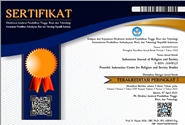Two Lane Settlement of Sharia Economic Disputes Between Religious Court and National Sharia Arbitration Agency (BASYARNAS)
Abstract
The development of the sharia economy, particularly in the banking sector, both domestically and abroad, is very encouraging. Because of his young age and lack of adequate understanding of various economic practices, Sharia opens the possibility of strife. When there is a Sharia economic dispute, there are two institutions that have the authority to handle the settlement, namely the Religious Court and BASYARNAS. Both institutions, both the religious court and BASYARNAS, have advantages and disadvantages in handling Sharia economic disputes. Openness must be developed from various parties who prefer Islamic shura (consensus) in determining everything and solving problems. Through Shura disputes can be resolved satisfactorily, can still maintain the privacy of the parties, the closer the relationship between the parties, the time can be shortened, the more cost-effective, and the relationship between the parties can be improved better. If you see that the resolution of economic disputes through BASYARNAS Syariah can be submitted before resolving disputes through the Religious Courts. Considering the new Shariah economic practices, it still needs to be disseminated in addition to the implementation of sharia economics, it also requires human resources and top-class facilities, as well as a complete constitutional and operational foundation.
Keywords
Full Text:
PDFReferences
Anwar, M., Yaswirman, & Ulfanora. (2019). Dispute Resolution of Shariah Economy in Murahabah Financing Contract in Sahabat Mitra Sejati Cooperatives. International Journal of Multicultural and Multireligious Understanding, 6(3), 72–78.
Bahder, J. N. (2008). Metode Penelitian Ilmu Hukum. Bandung: Mandar Maju.
BASYARNAS. (2014). Profil dan Prosedur.
Manik, S. M. T., Yaswirman, Azheri, B., & Ikhwan. (2017). Penyelesaian Sengketa Ekonomi Syariah Melalui Pengadilan Khusus Ekonomi Syariah di Lingkungan Peradilan Agama. Ahkam, 17(2), 435–448. https://doi.org/10.1017/CBO9781107415324.004
Masriani, Y. T. (2016). The Position of Notarial Deed in the Sharia Economic Dispute. Mimbar Hukum, 28(1), 162–173. https://doi.org/10.22146/jmh.15861
Masse, R. A., & Rusli, M. (2018). Islamic Banking Dispute Resolution in National Sharia Arbitration Board. In IOP Conference Series: Earth and Environmental Science (Vol. 175, pp. 1–6). https://doi.org/10.1088/1755-1315/175/1/012169
Musjtari, D. N., Radliyah, N., & Riyanto, B. (2019). The Mediation Process in Sharia Economic Dispute Resolution Through the Religious Court in Indonesia. Journal of Humanities and Social Science, 24(5), 39–47. https://doi.org/10.9790/0837-2405053947
Purwosusilo. (2013). Wawancara Dirjen Badan Peradilan Agama. Majalah Peradilan Agama.
Rasyid, R. (2010). Hukum Acara Pengadilan Agama. Jakarta: Raja Grafindo Persada.
Triana, N. (2017). Reconstructing Sharia Economic Dispute Resolution Based on Indonesian Muslim Society Culture. Ijtimā’iyya, 2(1), 107–128. https://doi.org/10.24090/ijtimaiyya.v2i1.1099
Triana, N. (2018a). Alternative Dispute Resolution Model in the AJB Bumiputera Life Insurance Company of Purwokerto in Shari’ah Perspectives. Al-’Adalah, 15(2), 367–388. https://doi.org/10.24042/adalah.v15i2.3004
Triana, N. (2018b). Urgency of Arbitration Clause in Determining the Resolution of Sharia Economic Disputes. Jurnal Ilmu Syariah, 18(1), 65–88.
UU-RI. Undang-Undang Nomor 30 Tahun 1999 Tentang Arbitrase dan Alternatif Penyelesaian Sengketa, Pub. L. No. 30 (1999). Republik Indonesia.
UU-RI. Undang-Undang Nomor 48 Tahun 2009 Tentang Kekuasaan Kehakiman, Pub. L. No. 48, Menteri Hukum dan Hak Asasi Manusia (2009). Republik Indonesia. https://doi.org/10.18860/ling.v5i1.609
UU-RI. Undang-Undang Nomor 50 Tahun 2009 Tentang Peradilan Agama, Pub. L. No. 50 (2009). Republik Indonesia.
Winata, F. H. (2012). Hukum Penyelesaian Sengketa: Arbitrase Nasional Indonesia dan Internasional. Jakarta: Sinar Grafika.
Yasin, M. N., Munir, M., Sukarmi, & Sahibuddin. (2016). The Norm Reconstruction of Verdict Execution of the National Sharia Arbitration Board to Sharia Economic Dispute in Indonesia. Journal of Law, Policy and Globalization, 51(1), 49–63.
DOI: https://doi.org/10.36256/ijrs.v1i2.66
Refbacks
- There are currently no refbacks.
Copyright (c) 2020 Indonesian Journal of Religion and Society

This work is licensed under a Creative Commons Attribution-NonCommercial 4.0 International License.
Indonesian Journal of Religion and Society (IJRS) Is Indexed By:

Indonesian Journal of Religion and Society (IJRS) is distribute under Creative Commons Attribution-NonCommercial 4.0 International License.













